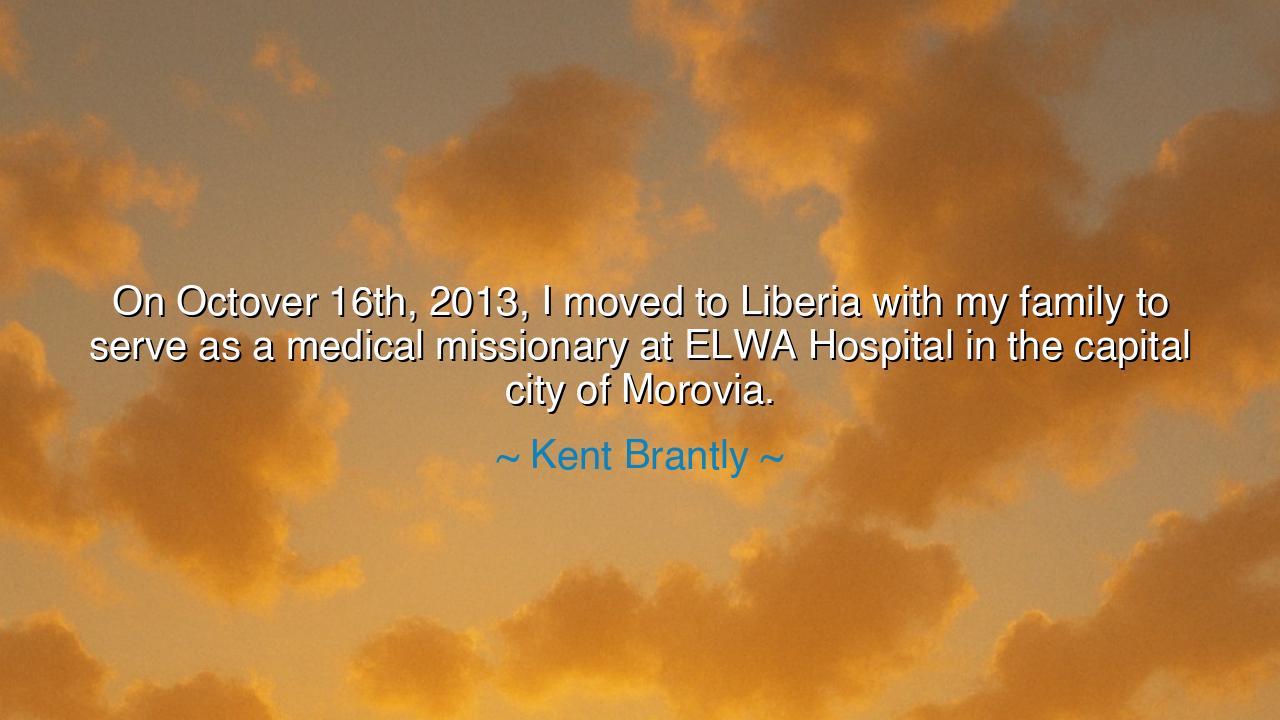
On Octover 16th, 2013, I moved to Liberia with my family to serve
On Octover 16th, 2013, I moved to Liberia with my family to serve as a medical missionary at ELWA Hospital in the capital city of Morovia.






The words of Kent Brantly rise like a testimony written not in ink, but in courage: “On October 16th, 2013, I moved to Liberia with my family to serve as a medical missionary at ELWA Hospital in the capital city of Monrovia.” This is not merely a statement of travel or duty—it is a declaration of faith, sacrifice, and service. It speaks of a man who left behind comfort for compassion, who crossed oceans not for gain but for giving. Within these words lies a story that transcends borders: the story of a heart willing to place itself in the midst of suffering so that others might live.
In every age, there are those who hear the call to serve beyond the walls of safety. They are the missionaries, the healers, the silent warriors of mercy who walk into places of need with nothing but love as their armor. Kent Brantly, a physician from the United States, answered that ancient call. When he and his family set foot in Liberia, they stepped not into a land of prosperity, but into a place still scarred by civil war and poverty—a place where disease, fear, and scarcity had long been cruel masters. Yet he came not to judge or to pity, but to serve—to bring healing through medicine, and hope through presence.
In 2014, the shadow of the Ebola epidemic fell across West Africa like a storm. It was a plague that brought nations to their knees, consuming lives faster than help could arrive. ELWA Hospital, where Dr. Brantly served, became one of the few beacons of care amid the chaos. There, he treated the sick with unwavering devotion, though each patient he touched could carry death to his own door. And so it was that compassion tested him to its limit—he himself became infected. Yet even as his body weakened, his faith remained steadfast. His eventual recovery, aided by global medical efforts, became a symbol of human perseverance and divine grace.
Brantly’s quote, simple and unassuming, marks the moment that began this story—the crossing of a threshold between comfort and calling. It is a reminder that heroism rarely announces itself with grandeur; it begins quietly, in a choice. To move to Liberia, to serve in Monrovia, to enter ELWA Hospital—these are the humble steps that led to one of the most inspiring acts of modern medicine. His journey was not one of fame but of purpose, not of power but of service. In choosing to heal others, he revealed what the ancients called agape—the love that gives of itself without measure.
Throughout history, there have been others like him—men and women who placed duty above safety. Consider Florence Nightingale, who entered the blood-soaked fields of the Crimean War with her lamp and her faith. Surrounded by disease and despair, she too transformed a place of death into one of healing. The world remembers her light not because it shone in comfort, but because it refused to dim in darkness. In the same spirit, Kent Brantly’s journey to Liberia stands among those noble flames of service that burn through time.
His story teaches that to serve others, especially in their suffering, is to touch the divine within oneself. In our modern age—so filled with convenience and isolation—his example stands as a rebuke to fear and indifference. He reminds us that healing is not only the task of doctors, but of all who are willing to love, to listen, and to act. We need not travel across the seas to be missionaries of compassion; the world’s pain lies as near as the next heart that needs understanding.
So, O listener of these words, learn this truth: life’s highest calling is not comfort, but service. The measure of one’s days is not in what is gained, but in what is given. When the voice of compassion calls you—whether to the farthest land or to your own neighborhood—answer it with courage. For in serving others, you serve something greater than yourself.
And when the story of your life is told, may it echo the spirit of Kent Brantly’s words—not as a tale of fear, but of faith; not as a journey of escape, but of purpose. For the one who walks toward suffering with open hands becomes, in truth, a light for the world.






AAdministratorAdministrator
Welcome, honored guests. Please leave a comment, we will respond soon